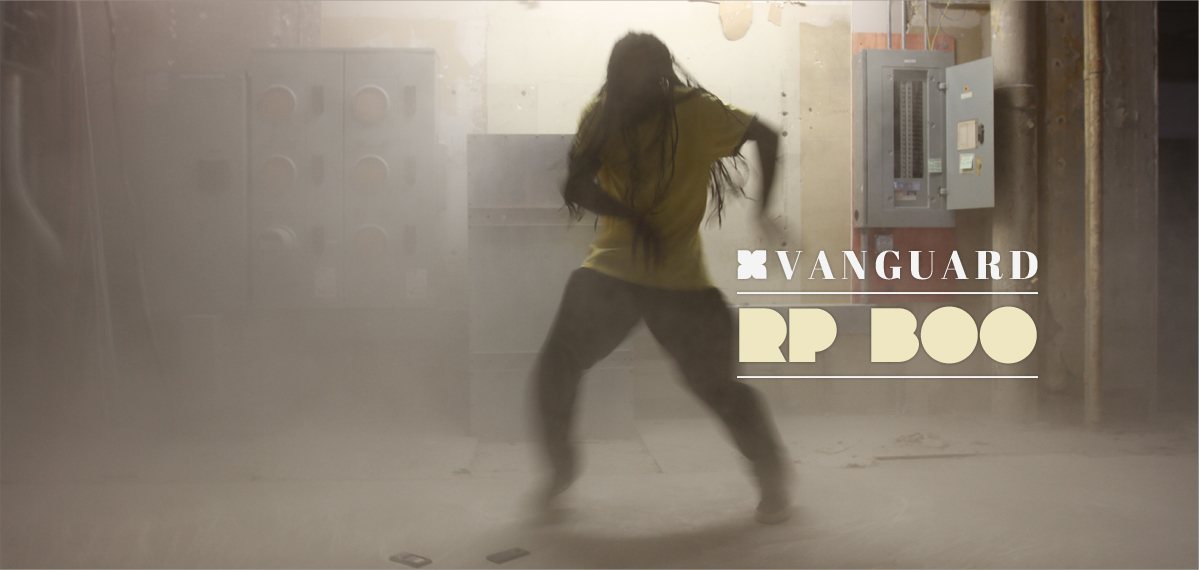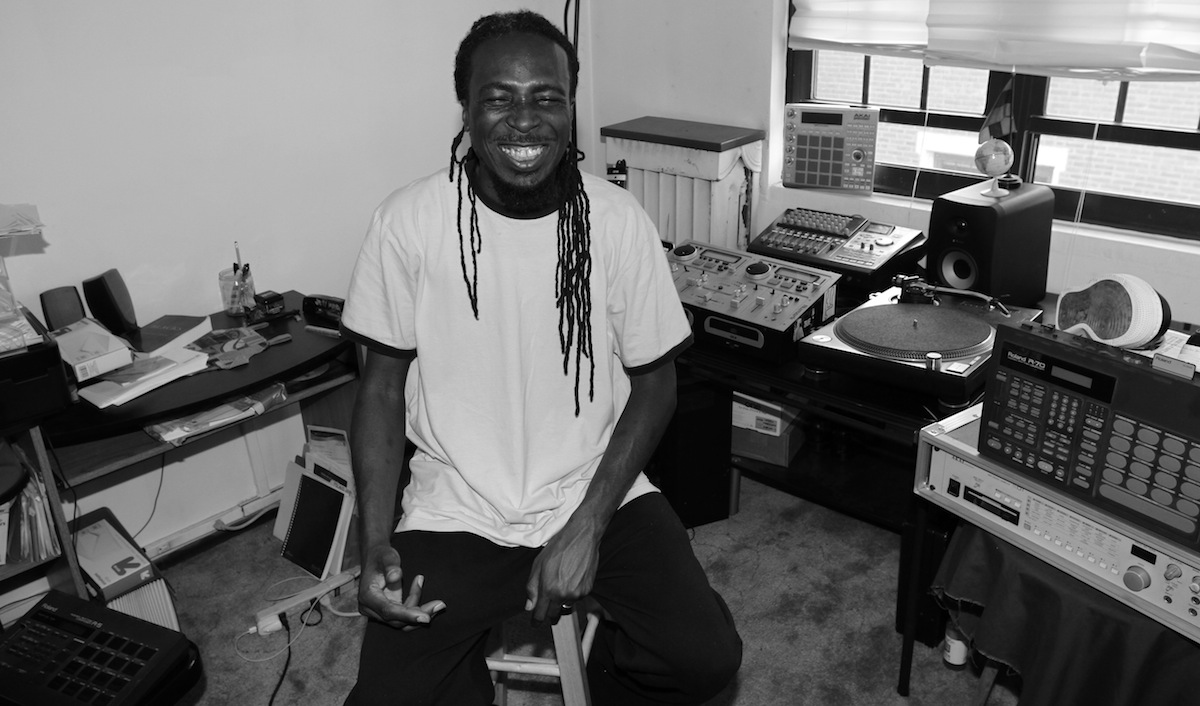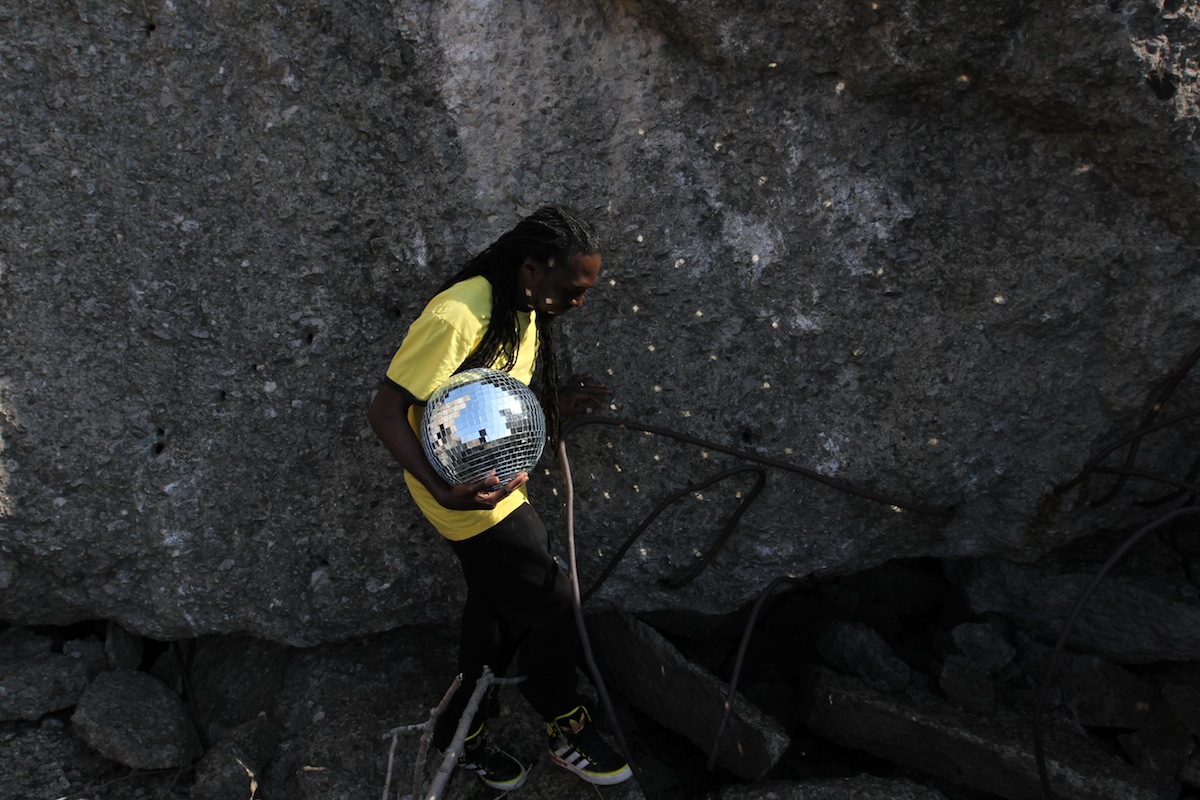Vanguard: RP Boo
A founding father of footwork releases 'Fingers, Bank Pads & Shoe Prints' on Planet Mu.

Vanguard: RP Boo
A founding father of footwork releases 'Fingers, Bank Pads & Shoe Prints' on Planet Mu.

It’s notoriously difficult to write an accurate history on the rise of any music scene, even a localized, tightly focused one—particularly if it has its roots in pre-smartphone, pre-nonstop-documentation days. It ends up being a pick-and-choose sort of game, with legions of personal tales, alternate attributions and conflicting information that can make Rashomon seem like a simple revenge flick. Even the familiar origin stories, like that of Detroit techno, come in multiple versions. And that kind of complexity is as inherent in the history of footwork—the raw, highly syncopated, 160-bpm, sample-heavy form of electronic music that inhabits a vibrating dimension between abstraction and precision—as it is in any other.
But there are a few things we can say about footwork with certainty. It comes from Chicago, born and bred in that city’s dance-battle world; it’s the main branch of an evolutionary tree that’s arisen from ghetto house and juke roots; recent years have seen the sound find international favor, despite its inherent weirdness (it can be pretty rhythmically out–there at times); and Kavain Space, the DJ and producer better known as RP Boo, is at the music’s epicenter.
Plenty of others can claim a role in footwork’s development—DJ Deeon, DJ Spinn, DJ Milton, DJ Clent, Traxman and the late, much-missed DJ Rashad among them—but Space is generally considered to be the sound’s prime mover, the man who, more than any other, molded, baked, and crystallized the sound into what it is today. A dancer who hooked up with the House-O-Matic crew in the ’90s, he gravitated toward DJing and quickly rose through the Windy City ranks; producing followed, as it often does, and Space used his knowledge of what dancers crave to create a series of evolutionary, revolutionary tracks like 1997’s Old Dirty Bastard–sampling “Baby Come On.” It was a cut that wasn’t even credited to Space that started bringing him fans outside Chicago: “11-47-99” (a.k.a. the Godzilla track), produced for, and originally credited to, his comrade-in-arms DJ Slugo. Like most footwork cuts at the time, it was originally released as a white label—and the ominous, skittering tune was perhaps the genre’s biggest tune yet.
Still, it wasn’t until 2007, when he released the influential Dude Off 59th Street mixtape, that Space really began to attract worldwide attention. Word of the sound reached Planet Mu’s Mike Paradinas—a collection of Space’s tracks, 2013’s rapturously received Legacy was the result, followed a year later by the Classics Vol. 1 EP. Now, Space and Planet Mu have released Fingers, Bank Pads & Shoe Prints—and it’s a stunner, brimming with songs both skeletal and celebratory, and sounding like little else out there. Speaking over Skype as he chilled between gigs in his Chicago home, the enthusiastic Space seemed both surprised and thankful at what life—and footwork—have brought his way.
We’ll start with the most basic of questions: RP stands for Record Player, right?
Yeah! And when I was a young guy, I asked my uncle, “Where did Boo come from?” He said, “It’s because you were the darkest grandchild of the family, so it was like “boo” as in Caspar the Ghost. I was like, okay, I’m good with that! Also, my father’s nickname is Yogi, because he liked Yogi Bear—and my name kind of relates to his sidekick, Boo-Boo. So it all fits!
Speaking of your father, is it really true that he used to play bass with Prince?
He was traveling through Minnesota and met Prince before he started playing with him. Once I asked him, “How did you actually get that gig?” It turned out he was doing some other project in Minnesota, and somebody asked him to try out for Prince’s band, and of course he said he would. So he played for Prince for like two hours and half hours. Finally, Prince asked him to play “Purple Rain”—and after he played it, Prince just said, “You know, you’re officially in now.” And he stayed with Prince for around five years. This was around the NPG days.
So you have quite a bit of a musical heritage, and are sort of following in your father’s footsteps.
Yes, that’s what it is.
“Discover who you are, and just play. You never know how it’s gonna end up.”
And you are certainly doing it well. Most people credit you with being the guy, or certainly one of the guys, who invented footwork. Do you feel you can take credit for that?
Maybe, but I never saw it coming. And when it did happen, it took my years to understand it. When it came about, I looked at my journey, and who it was I was doing parties for, and what they had contributed, and looked back at the dancers, and I can see where footwork started brewing. I have to say, though—it really was like, hey, we’re just doing a party, and the kids are doing their thing. But around 2004 or 2005, there was a guy here in Chicago who had a show called Wala Cam, and he used to show kids footworking at parties. I was watching it and realized, that’s nothing new that they’re doing—this guy’s just taking it to a whole other level! A lot of the tracks they were playing were actually a lot of my own tracks.
When I finally got to meet this guy, I realized that he was in my seventh-grade class! When I started telling him what I had been doing, and he started doing his research, that’s when it kind of started. People started telling me, “Wow, we’re finding out a lot about you!” They started finding out about House-O-Matic and all that. They would say, “That sound backtracks to everything you’ve had done, so I guess nobody else could have done it. You’ve been the one who kept it going.” I was just thinking, this is just what I do every day! I was making tracks; I was able to play tracks at places most people couldn’t go. Promoters would go to me, “We know you got the good tracks! We know you got the heat! You’ve got to play!” So I was able to go all over Chicago and play all these new tracks, and it was growing from there. People were going, “You gotta hear RP Boo—he’s got that new heat.” And after that started happening, everything was happening—everything was history.
And it’s still happening—more than ever, I would guess.
I’m still in shock that I was part of making this grow. It’s still unbelievable. I catch myself saying, “Why me?” I just didn’t want to see any kind of dance music die out, so I was making and playing this stuff, sharing what I had learned over the years. I was just expressing my inner side through my music, in the only way I know how. My father’s told me, “You have a lot of wisdom, and you have a lot of heart. That’s what makes you stand out. That’s why I tell people, “Discover who you are, and just play. You never know how it’s gonna end up.”
“I realized that it was now my turn to actually be the one to construct and orchestrate these battles, and I fell in love with it.”
But how did it end up being footwork, specifically?
I don’t really know! But genres are always going to be remade. Music’s unlimited.
What were you originally playing when you first started DJing?
I was playing house, and I loved old-school, New York–style hip-hop. I still love it! But I was playing some party once, and he said, “Don’t play rap tonight—play all tracks.” That’s when Dance Mania was still going strong. So I played for five hours—strong, because I had the music to play. And after I was done playing, I was never asked again to play any rap. That night is what helped me become who I am today. That’s the night that I started playing as me, I think—just playing the tracks as myself.

Footwork is centered on the world of dancing and battles. For those who aren’t that familiar, can you describe that scene a bit?
Let me tell you how I first came into that. I was going to a party that House-O-Matic was doing, and Deeon and Milton were spinning that night. As I walked in, this one guy was telling me about these dancers: “This is so-and-so, that’s so-and-so.” This was my first time to see off-the-stage dancing like that—groups of friends, circles, and people jumping into the circles, like, “Hey, check this move out!” I was like, wow! And I wasn’t even paying attention to the actual footwork part—that was the bonus that came later. I was paying attention to the body movements, the whips, the spins, the straddling like you’re riding a horse, moving your arms back and forth. I thought it was real nice. So time goes by, and I had been thinking that I want take this to a different level; I want to join House-O-Matic.
Later on…I can remember it was a Wednesday, I think around 1993, and I came into House-O-Matic. I had a mixtape, and I presented it to the president, saying, “I’m a dancer, but I’m also a DJ”. He was like, “Cool,” and started playing the tape. This girl comes in and says, “Man, that’s a nice tape! Did Deeon or Milton do that?” And he said, “No—we have a new member!” And by the next week, I started getting calls saying, “Can you do a party for us?”
The first party was okay. The second party was kinda duh. Then came the third party, which was gonna be the bigger event. I’m playing, and I’m seeing multiple circles. I realized that it was now my turn to actually be the one to construct and orchestrate these battles, and I fell in love with it.
How did you first hook up with Slugo?
That was a couple of years later. I actually met Slugo and DJ Clent the same day. Slugo was talking to Clent and Milton: “Who is this guy up there? Can I spin?” They were like, “No, that’s DJ Boo; he’s the promoter’s main DJ.” He didn’t know who I was, but he soon saw that my skills were just mad; I was the person who you just could not knock off. But my man Slugo and I eventually became real cool. We became good friends. And I had actually already gained all the footworkers that I could as a DJ, and there was nothing else to do—so that’s around when I started learning how to make tracks. A lot of us were deejaying, and the battles were already there, so that was the next step.
Were you calling what you were spinning footwork at that point?
Let me see—that would have been about 2002 or 2003, after that Waxmaster “let me see your footwork” track came out. That’s when it started to become gradually started to become footwork. And after MySpace came around and word started getting out, everybody was like [snaps his fingers]—“Oh, that’s Chicago footwork!”
There’s this great quote from you from the Fingers, Bank Pads & Shoe Prints press release: “Footworkers need fuel—and they often say, ‘Only you can get us to battle like that.'”
Oh, I know how to get ‘em! [laughs] I can take them to another level. And now I’m taking it from Chicago to the world. And whatever happens with footwork…it might not be in Chicago—it might be in Japan, it might be in the U.K., or it might be in California. I don’t know, but I know what I’m looking for. I mean, Chicago will always have it, but people myself, DJ Spinn, Traxman…we’re out traveling and taking it beyond Chicago. So we’ll see what happens next.
Speaking of traveling, is it true that you had never played outside the U.S. before you played the Unsound Festival in Poland in 2013?
That was the first time! I loved doing Unsound, and I will always be grateful to them.
A lot of people credit that gig as the one that brought footwork to a truly international audience—at least in part through your impromptu dancing at the gig.
Yeah, it was. I said to myself, I’m gonna give them something. I’m get to the show, I crank up, and then it just hit me: “Now’s my time!” I came around the booth, and I just started doing what I need to do. Everyone was like, “What has just happened?” I gave them a show, and they were finally able to see it for themselves. And that was it, and that’s what started to bring it worldwide. You know, people have seen footwork through YouTube or whatever, but I’m like, I’m able bodied—why not really show them? So I do that almost every show.
To make the kind of music that you make, do you think it’s important to be a dancer?
Being a dancer enhances it, for sure. But at this point, it’s been my life for a long time, so I can produce it knowing what I know. That’s a gift that I have. Rashad was another person who was able to do it.
Were you close with him?
Me and Rashad were real close! Of everybody in Chicago that we could talk about—and that includes DJ Slugo—we knew each other the best. But it’s sad—we both became international, but we never got a chance to play internationally together before he passed away. I think he looked at me like his power pack—someone who could help him refuel. And he was the same for me. We definitely would have done something together on this grand stage—there was no animosity between us at all. It was like, “I got you now, RP!” “Okay, Rashad!”
“The important thing is that every track is gonna tell a story; every track is gonna be totally different; every track has its own meaning.”
Your career stretched for years before you put out your first album—and now your second one is out less than two years later. Were you hard at work producing that whole time?
Yeah, but really, I had a lot of tracks put aside from before, so there are tracks produced from all different times. When Mike [Paradinas, head of Planet Mu] started picking and choosing tracks for Legacy, they were tracks that went all the way back. But there were just so many! And if the question is, were these tracks done after Legacy? Some were done before, some were at the same time—and there’s some new stuff as well. I told Mike, don’t ask me what year it was done—just put it out there! It doesn’t matter. To the listener’s ears, it’s all new. But the important thing is that every track is gonna tell a story; every track is gonna be totally different; every track has its own meaning. The only important thing is to be relevant.
Are there any tracks that are particularly relevant to your own experience?
“Let’s Dance Again” is one. I was missing seeing people dance in Chicago; I missed seeing people feeling free to move how they want to move. I didn’t really want that one to be a real battle-style song—I just wanted it to be a dance song. The battles at House-O-Matic? That all came from people just grooving and shaking their bodies. So that one means a lot, and so does “Your Choice.” That one’s all about the funky groove. I couldn’t really do what I wanted to with the sample on that one, but the concept is all about just keeping the groove.

How do you decide what to sample? There’s that one track that samples a famous opera, for instance.…
“Sleepy!” I had that a long time before I even thought about it. Really, it’s all about what will help me be able to tell my stories. And I want to do things that are totally different, and I’ll get ideas from anywhere—cartoons, TV shows, wherever. You just have to keep your ears open, and if you find something that you think will help you tell a story, that’s great. But you don’t need a sample to tell a story. You can do it all kinds of ways.
And you’re doing it through footwork.
You know, I never was really paying attention to what was happening—but we were creating history. And we’re still making history today. It’s taken me a while to look at all this for what it really is. I’m doing something to leave behind; I’m representing all of this. I’m very thankful for this album—but there’s still work to be done, and I can’t stop. There’s still a story to be told.

